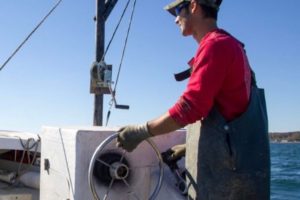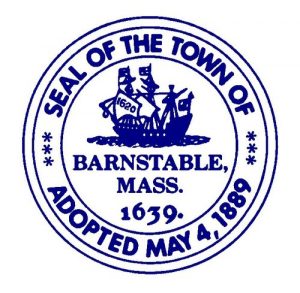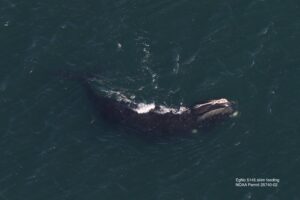
Dan Martino on his grant in Oak Bluffs. The Martinos support Senator Cyr’s efforts to combat ocean acidification. Photo courtesy of Dan Martino
CHATHAM – Although it was years ago, Dan Martino well remembers how hatcheries in the Pacific Northwest watched their shellfish seed die, ravaged by ocean acidification.
“The shellfish basically dissolved in front of their eyes,” Martino says. “The ocean water had grown too acidic.”
When Dan and his brother Greg got their oyster grant on Martha’s Vineyard in 2014, and became the first oyster farm in Oak Bluffs history, that memory became even more sinister.
The hatcheries in Washington State, which were using seawater to grow, changed their model and began buffering the water, adding something similar to lime, to bring up the pH.
The Martinos, who own Cottage City Oysters, figure it is only a matter of time before the same phenomenon hits the East Coast. They are trying to get in front of a problem that could crush an increasingly important industry to the economy of the Cape and Islands.
“This is something our industry is going to face in the next decade. It’s inevitable and it’s a threat,” he says.
That’s why the Martinos enthusiastically supported legislation by Cape and Islands Sen. Julian Cyr, and Rep. Dylan Fernandes, who represents the islands and a part of Falmouth, to form a commission to find out how commercial fisheries are being effected by ocean acidification, and address gaps in scientific knowledge.
“The acidification of our oceans is yet another significant and emerging threat due to climate change,” said Cyr. “The work of this commission will help us better plan for the changes to come, especially to safeguard the Cape and Islands’ vibrant aquaculture industry.”
The 17-member commission came into being when Governor Charlie Baker signed the environmental bond bill this fall; its first meeting is scheduled for next month and public hearings are on the horizon.
Stephen Kirk, of The Nature Conservancy, has been tapped for the committee and said there is a lot to learn about the dynamic topic, particularly the nexus between coastal nitrogen loading and acidifying waters along with increased carbon dioxide in the atmosphere.
“The Nature Conservancy hopes to play a role in developing the science that can inform policy and decision-making, and help coastal communities prepare for and mitigate against ocean acidification,” he said.
Scientists estimate about 30 percent of carbon in the atmosphere is absorbed by the ocean; as we introduce more carbon into the air, more ends up in the sea. Some research shows there has been a 30-percent increase in acidity in the last 200 years, with a skyrocketing trajectory.
Renee Gagne, shellfish constable in Chatham, always has ocean acidification in the back of her mind. The town has an upweller system to feed growing shellfish, and is looking to expand capacity. That stock helps bolster the wild fishery which is a lifeline for the town; if fin fisheries aren’t doing well, people can always go scratch up shellfish. So she believes efforts to study and prepare for ocean acidification will pay dividends.
“It’s certainly an emerging issue,” she said. “And hatcheries are going to be on the front line.”
The increased acidity inhibits the ability of shellfish, particularly larvae, to build shells. It also can harm older shellfish and make it difficult for them to close their shells, making them more susceptible to predators.
Since the problem is insidious, and usually hidden, it is difficult for many to understand its potential magnitude. But what’s at stake is clear: In 2017 Barnstable County Shellfish landings of oysters, quahogs, bay scallops, steamers, and razor clams were worth $22.4 million. The value of shellfish represents 30 percent of all marine seafood landed in the county and aquaculture alone was worth $14.1 million, or 19 percent of the county’s seafood landings.
The wild fisheries are also in peril. Sea scallops and lobsters are expected to be particularly hard hit and early studies show fish like pollock detect predators less easily in acidic waters.
“Acidification is a serious threat to the blue economy of Massachusetts,” said Melissa Sanderson, chief operating officer of the Fishermen’s Alliance. “Massachusetts’ ocean economy directly accounts for more than $6 billion annually and approximately 81,600 jobs. Tourism, recreational and commercial fishing, and shellfish aquaculture all directly depend on coastal water quality and for centuries healthy ocean resources have been integral to the way of life in Massachusetts.”
The problem has already reared its head on the East Coast. Almost a decade ago, larval oysters at Mook Sea Farm hatchery Maine were harmed by increased acidity in its intake water.
“Since hatcheries operate under extremely controlled conditions, Mook Sea Farm and other hatcheries have overcome the problem by buffering our water. However, we are still wondering how ocean acidification will affect our grow-out operations where we grow oysters to market size, and where water chemistry is out of our control,” Mook’s owners said as they introduced a survey that went out to commercial interests up and down the coast.
Martino has already taken steps to stave off impending changes. His company Cottage City (Oak Bluffs’ moniker before 1907), is working with Woods Hole’s Marine Biological Laboratory to experiment with different seaweeds to act against increased acidification. The seaweed could be placed around grants or natural sets to buffer the ecosystem.
There is also a program Cottage City supports which encourages – through a tax credit – the return of oyster shells to the water. Shells are calcium bicarbonate and neutralize acidity.
“It’s like throwing Tums into the ocean when it has an acidic stomach,” Martino said.
Martino said California just came out with a report on ocean acidification. Because of this new commission, Massachusetts won’t be far behind; a report is due late next year.
“This commission will bring together scientists, fishermen and women, and policy makers to work to preserve this economically, environmentally and culturally important industry on the Cape and Islands,” Fernandes said.
By DOREEN LEGGETT, Cape Cod Commercial Fishermen’s Alliance
























